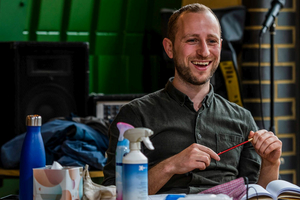Guest Blog: Guy Woolf On Making 'Money' Out of an Ethical Dilemma
The Director of 'Money' Talks About His Zoom-era Production

A few years ago, I had a meeting with an industry professional about our company represent. We founded represent. [the lower case and full stop are intentional] two years ago - though really it had been in the works for 5-6 years by then - to redress the socioeconomic imbalance in the arts. We wanted to establish a repertory theatre company that would serve as a paid alternative to increasingly unaffordable drama school training. We had suffered numerous bumps in the road, but things were looking up as we had secured funding and our first season of work was fully programmed and booked in.
At this meeting, I was told about a sizeable donation that had been received from an ethically dubious source. The entire board of directors was assembled and they debated whether to accept the donation or not. After hours of discussion, the majority of the board voted to turn it down. Instantly, the idea for Money was born.
We wanted to explore the idea of planting the audience squarely in front of this dilemma: they have the power to vote to either accept or reject the donation. We knew it had to be an active, rather than passive, experience for the audience to engage fully with this conundrum; they had to be key in the decision-making. As soon as the pandemic halted our inaugural season of staged productions, we decided to research and develop the concept of Money.
We engaged playwright Isla van Tricht to work with our cast on a virtual research and development before commissioning her to write it. We realised that this idea had great potential to be performed on Zoom: by this time, Zoom and its idiosyncrasies had become part of the vernacular ("You're on mute!") However, a lot of the work we had seen online seemed like it wasn't explicitly written for the form. We felt there was a real opportunity to lean into the technology and create a production that wasn't just made for Zoom but made by Zoom.
At the beginning of her writing process, Isla did a lot of work thinking about Zoom as a stage: what are the things that can happen on Zoom that can't happen in a theatre? How do we make the most of the platform? How can we change our views on how the audience experiences and engages with this story in an exciting way? What do we expect from a Zoom space and how can we disrupt that?
The decision was made to write in as many Zoom features to the script as possible: "Polling" allows the audience to vote for or against taking the money, and in order for that to have an impact, Isla wrote several endings depending on the result of the vote. "Breakout Rooms" allow the audience to choose which storylines to follow and therefore which secrets are revealed to them, drawing on tropes of immersive theatre made by companies like Punchdrunk. There are in fact 27 different versions of the narrative depending on the individual choices made by the audience. [Mel Giedroyc in the trailer for Money below]
Additionally, an entirely new language can be exploited to tell more of the characters' stories: what name do they use on their Zoom account? Is it something embarrassing from the quiz night they did at the weekend? Does the person write their name in full? Do they include pronouns? Their job title? There's the person who has an amazing microphone and can dominate the conversation, or someone who overuses the "reaction" buttons.
It also gave us the opportunity to design five different sets, one for each character. Zoom offers a window into the private lives of individuals we would never usually be able to see. It is a unique stage: there are those few seconds before you realise that you have successfully joined a call when everybody can see your concentrated, unguarded (and usually unflattering!) face before you switch on the smile to say hi. There are the moments where your eyes wander to the bookcase behind, or the poster, or flag, or child, and you realise that right there in front of you is something you didn't previously know about that person.
We saw all of these idiosyncrasies as opportunities to tell the story in more detail.In many ways, digitally streamed theatre is much more accessible than a lot of traditionally staged theatre: geographically, financially and in terms of certain physical access needs or the need for relaxed performances. We wanted to make the most of this, to reach as widely as possible, for it to be live and for the audience to have an impact on what they experience and on the outcome of the story. Money is designed to be enjoyed online, and the work we've done from inception to production has focused on the audience's virtual experience. We hope you enjoy the show!
Photo c. Guy Bell
Comments
Videos

